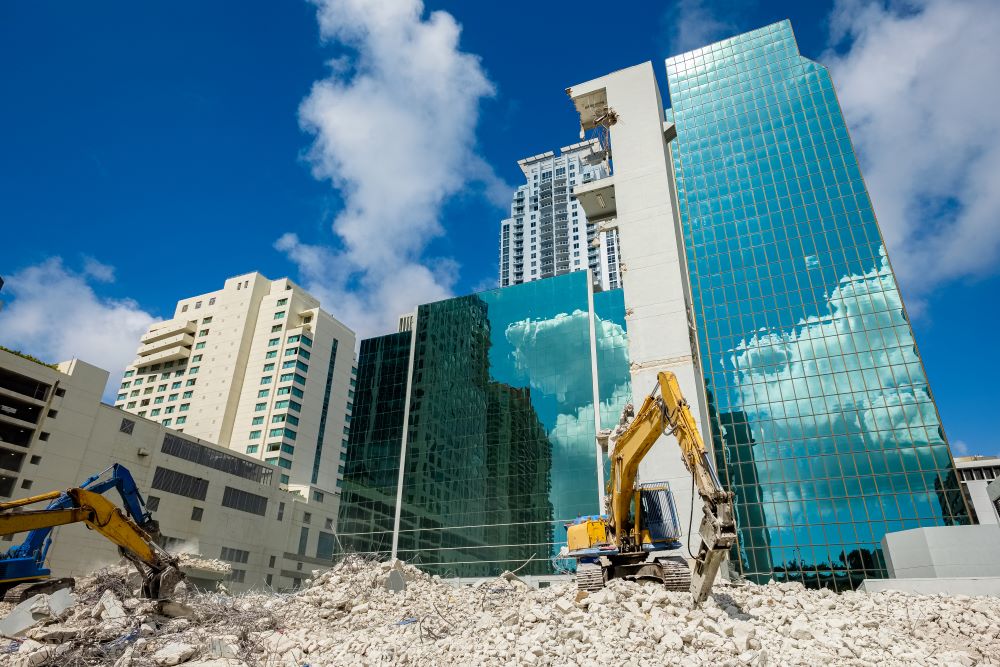
Cost Efficiency Strategies in Industrial Demolition Services
In the very competitive industrial demolition services market, cost effectiveness is a key differentiator for successful businesses. The ability to provide high-quality demolition services while conserving costs has become more important as companies in this industry attempt to retain a competitive advantage.
Businesses may increase both their overall competitiveness in the market and their bottom line by concentrating on cost efficiency. Using cost-cutting measures that work may result in larger profit margins, more attractive project bids, and the capacity to finance staff training and the newest technology. This may thus result in higher customer satisfaction, quicker project completion schedules, and improved service quality—all of which are necessary for sustained company success in the industrial demolition sector.
OUR SERVICES
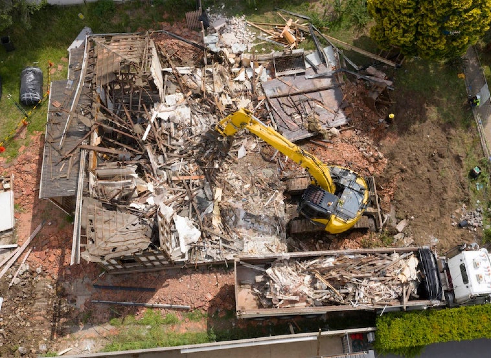
Structure Demolition. Residential, Commercial & Industrial
If your structure poses a health, safety, or environmental risk, demolition can prevent costly citations or fatal accidents. While this may seem daunting, you are just a phone call away from having your residential demolition done professionally, responsibly, and at a great price.
Talk to a Demolition Specialist Now! 916.249.5001
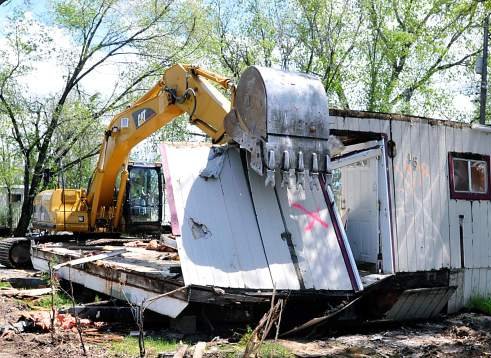
Mobile Home Demolition
We demolish and haul away mobile homes. Any size, anywhere, anyhow. We are fast, clean and competitive. We serve most of Northern California. There are many factors to consider when removing or demolishing your old trailer, mobile home, or manufactured home like: the processes involved, costs, time, contractors, debris, and permits.
Talk to a Demolition Specialist Now! 916.249.5001
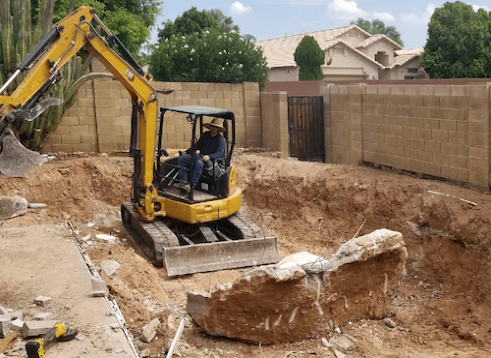
Pool Demolition
When removing a pool in Sacramento, California with the professional demolition team of Maxton Demo, you’re guaranteed peace of mind from beginning to end. From your initial request for an estimate to clean-up, you can expect our pool demolition process that’s completely professional and safe.
Talk to a Demolition Specialist Now! 916.249.5001

Floor Demolition
Flooring demolition, like any other major home renovation work, requires a specific set of skills and tools to be performed properly. You need experts in flooring demolition to get you the best floors possible. Contact us to find out more about how we can help you today.
Talk to a Demolition Specialist Now! 916.249.5001
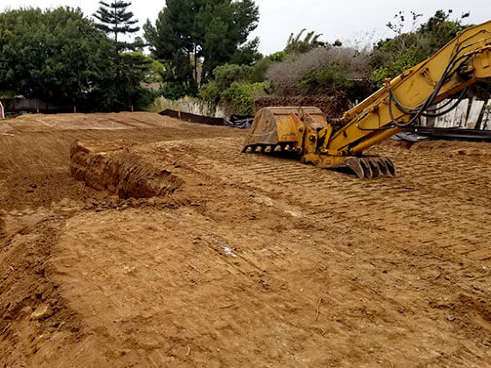
Grading & Excavating
If you need an experienced excavator and grader in Sacramento, call us today. One of the many reasons that residential, commercial, and industrial customers choose to work with us is because we’re able to provide a broad range of services to help construction-related projects get done in less time and at a reduced cost.
Talk to a Demolition Specialist Now! 916.249.5001

Roof Snow Removal
Heavy snow & ice dams can cause significant roof and home damage. Roof Snow removal is our specialty during the winter months. Serving the Sacramento, California area for 10 years, we can get your roof snow removed and promise a quick response and reasonable rates.
Talk to a Demolition Specialist Now! 916.249.5001
Typical Expense Elements for Industrial Demolition Projects
The first step in creating efficient cost-reduction plans for industrial demolition projects is to determine the major cost drivers. Several noteworthy aspects are involved in the total expenditures of these projects, including:
Labor costs: Hiring and keeping competent personnel may be expensive, but skilled labor is an essential part of any industrial demolition job. The costs associated with labor may be greatly impacted by variables including benefits, overtime compensation, and prevailing wage rates.
Machinery and equipment: Industrial demolition calls for specialized machinery and equipment, such as excavators, cranes, and hydraulic breakers, which are expensive. When frequent repair and replacement are required, the expenses of buying, operating, and maintaining this equipment may mount up rapidly.
Material disposal and recycling: Although they may be expensive, properly disposing of and recycling the materials produced during the demolition process is crucial. These costs may be influenced by variables such as landfill fees, transportation costs, and the accessibility of recycling facilities.
Environmental laws and compliance: Tight environmental laws that control the management and elimination of dangerous substances like asbestos and lead-based paint may drive up the price of industrial demolition projects dramatically. In addition to being required by law, adherence to these standards is essential to preserving a secure and long-lasting workplace.
Project management and planning: Ineffective project management and planning may result in extra costs, delays, and rework. Industrial demolition project cost overruns may be caused by a variety of factors, including insufficient risk assessment, erroneous cost projections, and poor coordination.
Techniques to Cut Costs for Industrial Demolition Services
Businesses may use a variety of tactics to improve their operations and save costs in order to handle the many cost issues related to industrial demolition projects. The following are a few of the best methods:
Planning And Managing Projects Effectively
In industrial demolition, cost containment requires careful project planning and management. Employing strong project management techniques enables businesses to recognize possible cost drivers early on and create mitigation plans for them.
This entails carrying out in-depth site analysis, drafting comprehensive project plans, and setting up open lines of communication with all parties involved. Throughout the demolition process, cost savings may be achieved by proactive risk management, effective resource allocation, and accurate cost estimation.
Businesses may also use project management tools and software to enhance data tracking, expedite processes, and make better choices. Industrial demolition service providers may guarantee project completion within budget, prevent delays, and cut down on rework by improving project planning and management.
Making Use Of Cutting-Edge Technology And Equipment
In the industrial demolition sector, adopting the newest tools and technology may alter everything by providing substantial cost and operational savings. These advancements, which range from sophisticated data analytics and automation to specialized demolition equipment and machines, may help businesses streamline their operations and save costs.
For instance, using semi-autonomous or remote-controlled demolition equipment may boost production, save labor costs, and enhance safety. In a similar vein, the use of digital technologies such as Building Information Modeling (BIM) may improve project planning, expedite collaboration, and reduce expensive errors.
Industrial demolition service companies may set themselves apart from the competition and increase their cost-effectiveness by investing in this cutting-edge technology. Additionally, by using less energy, paying less for disposal, and improving compliance with environmental standards, adopting environmentally friendly and sustainable technology may save money.
Ecological Demolition Techniques to Reduce Expenses
Using sustainable demolition techniques may be a very successful way to make industrial demolition operations more affordable. Businesses may minimize their environmental impact, save disposal expenses, and even create new income streams by adhering to the principles of reduce, reuse, and recycle.
The meticulous sorting and segregation of debris on-site is a crucial component of sustainable demolition. Businesses may cut down on the amount of garbage that has to be disposed of by sorting recyclable items like metals, wood, and concrete, which can result in considerable cost savings. Further enhancing the project’s overall profitability is the potential for cash generation from the sale of these recovered materials.
In addition to using deconstruction methods, which include carefully dismantling buildings or structures rather than demolishing them, sustainable demolition practices may also include these methods. By allowing for the rescue and reuse of construction materials, this strategy may lessen the requirement for new resources and the related expenses. Additionally, businesses may save money by using sustainable waste management techniques, including on-site recycling and processing, which can help them avoid the high expenses associated with off-site disposal.
Expert Labor’s Contribution to Cost Effectiveness
Achieving cost efficiency in the industrial demolition sector is mostly dependent on the caliber and experience of the crew. Not only are knowledgeable and experienced professionals necessary to guarantee the safe and efficient completion of demolition projects, but they also help reduce expensive mistakes, delays, and rework.
Industrial demolition service providers may improve their workers’ skills, knowledge, and problem-solving abilities by investing in their workforce’s training and development. This may result in increased output, wiser choices, and the capacity to adjust to project needs as they change—all of which may save costs.
Additionally, businesses that place a high priority on job satisfaction and staff retention stand to gain from lower labor turnover as well as the related expenses of hiring and onboarding new employees. Firms may attract and keep the greatest personnel in the market by creating a healthy work culture, giving competitive pay and benefits, and creating possibilities for career progression. This will eventually increase the firms’ cost effectiveness and overall competitiveness.
Achieving Industrial Demolition Services Cost Efficiency
In the very competitive industrial demolition industry, success depends on achieving cost efficiency. Industrial demolition service providers may decrease costs, improve their overall competitiveness, and optimize their operations by putting a variety of tactics into practice, including adopting innovative technology and sustainable practices, as well as planning and managing projects effectively.
The case examples included in this article show the observable advantages that come with putting cost-saving measures into practice. Through the use of cutting-edge technologies, the adoption of environmentally friendly demolition techniques, and workforce development initiatives, businesses in this sector may enhance their profitability while simultaneously setting themselves apart from competitors and providing customers with unmatched customer service.
The ability to sustain a competitive advantage through cost efficiency will become more and more important as the demand for industrial demolition services grows. Industrial demolition service providers may set themselves up for long-term success and profitability by keeping up with the most recent developments and industry best practices and by always looking for new methods to simplify their operations.
In summary, industrial demolition services that want to succeed in this competitive and dynamic industry must prioritize cost efficiency as a strategic necessity rather than as a means to an end. Industrial demolition service providers may seize new development possibilities, improve their financial performance, and establish themselves as leaders in the field by using the tactics discussed in this article.
Strategic Planning’s Financial Benefits For Demolition Projects
Strategic planning is essential for success in the fast-paced and sometimes unexpected world of demolition projects, rather than just a luxury. In the fiercely competitive world of demolition companies, each project has its own set of difficulties and dangers. These companies may find it difficult to handle the intricacies of a project without a well-thought-out strategic strategy, which might eventually jeopardize both their financial success and the caliber of their output.
In the demolition business, strategic planning entails carefully outlining each phase of a project from beginning to end. This entails thoroughly assessing the project’s scope, seeing possible roadblocks, managing resource allocation effectively, and putting safety precautions in place to reduce risks. Demolition companies may boost profitability and gain a competitive advantage by proactively organizing their operations to guarantee a seamless transition.
Furthermore, strategic planning in the demolition sector is concerned with guaranteeing the project’s safety and compliance, in addition to optimizing financial rewards. Because demolition work is inherently risky, companies may manage these obstacles and safeguard their employees, the neighborhood, and the environment by developing a well-thought-out strategic plan. Better customer interactions, increased reputation, and a more resilient company plan may result from this.
The Strategic Planning Of Demolition Projects Has Financial Advantages.
Cost optimization is one of the main financial advantages of strategic planning for demolition projects. Demolition companies may find ways to optimize their operations, reduce waste, and expedite procedures by meticulously planning out the project’s resources, schedule, and dangers. Significant cost reductions that have an immediate effect on the bottom line may result from this.
For instance, a demolition company may reduce the need for overtime labor and save money by carefully scheduling the order in which they do their tasks. Similarly, businesses may prepare for delays or interruptions and implement backup plans to prevent minor problems from becoming significant financial losses. By being proactive in their preparation, demolition companies may steer clear of the expensive fallout from unforeseen circumstances, such as project delays, legal battles, or penalties for noncompliance with environmental regulations.
Strategic planning for demolition projects may also help the company get more lucrative contracts. Demolition companies may stand out from the competition and establish themselves as the client’s first option by showcasing a deep comprehension of the project specifications and a well-designed execution strategy. This may thus result in more profitable project prospects and a more solid financial base for the company.
Economical Demolition Methods And Approaches
The application of cost-efficient procedures and tactics may have a considerable influence on the financial performance of demolition projects, making strategic planning an essential component of good project management. One such strategy is the use of selective demolition, which is the deliberate removal of certain architectural elements or structures as opposed to a whole and careless destruction.
Because it enables demolition companies to recover and reuse priceless resources, selective demolition may be a very successful and economical technique that minimizes waste and the need for disposal. Businesses may find possibilities to recycle or resell these components, creating extra income streams and offsetting the total project expenses, by properly managing the selective demolition process.
Using cutting-edge technology and equipment for demolition projects is another economical tactic. These specialized instruments, which range from high-reach excavators to remote-controlled demolition robots, may greatly increase the demolition process’s speed and accuracy while lowering the requirement for labor-intensive physical labor and lowering the possibility of delays or accidents. Demolition companies may increase efficiency, lower operational costs, and eventually boost profitability by incorporating these technologies into their strategic planning.
Optimizing The Distribution Of Resources In Demolition Projects
In order for strategic planning to be effective in demolition projects, resources such as labor, equipment, and materials must be carefully allocated and managed. Demolition companies may save a lot of money and increase the overall effectiveness of their operations by making the best use of these resources.
Equipment management is a crucial component of resource allocation in demolition operations. Demolition companies need to carefully evaluate what equipment they require in order to avoid spending excessive money on obsolete or underused gear and to make sure they have the correct tools and machinery for the task. Businesses may create a thorough equipment management strategy via strategic planning, which may involve the tactical deployment, upkeep, and purchase of equipment to optimize its use and reduce downtime.
In a similar vein, personnel allocation plays a critical role in demolition projects. The skill sets and availability of their staff must be carefully analyzed by demolition companies, and then their workforce must be deployed in a manner that maximizes productivity and reduces labor expenses. This might include strategic work outsourcing to subcontractors or outside providers, flexible scheduling, and the implementation of cross-training programs.
Reducing Interruptions And Delays In Projects By Using Strategic Planning
In the demolition business, delays and interruptions are frequent problems that may seriously affect a project’s financial success. In order to detect and address these possible problems and keep demolition companies operating smoothly, strategic planning is essential.
Creating thorough backup plans is one of the most important ways to reduce project delays and interruptions. Strategically planning demolition companies allows them to foresee probable roadblocks, such as equipment failures, material shortages, or unforeseen environmental circumstances, and create backup plans to deal with these issues. Businesses may minimize the effect on the project timeframe and total costs by promptly responding to interruptions by putting these contingency measures in place.
Additionally, strategic planning enables demolition companies to work more effectively with other stakeholders, including subcontractors, clients, and regulatory bodies. Companies may proactively address possible causes of delay or interruption and ensure that the project remains on schedule and under budget by creating clear communication channels and aligning expectations. Increased customer happiness, referral business, and a better reputation within the sector might result from this.
For Demolition Projects, Tools And Software For Strategic Planning
Using specialist software and digital technologies has become more and more important for strategic planning in the contemporary demolition sector. By using these technologies, demolition companies may increase the efficiency of their planning procedures, allocate resources more effectively, and manage projects more effectively overall.
Project management software is one such technology that enables demolition companies to make thorough project plans, monitor progress, and keep an eye on resource allocation. These systems often include sophisticated budgeting and scheduling tools, which let businesses foresee possible problems and take action before they happen. Through the integration of project management software into their strategic planning process, demolition companies may optimize their financial performance, make better decisions, and lower the likelihood of expensive delays.
Building information modeling (BIM) software is another useful tool for strategic planning in demolition projects. By using BIM technology, demolition companies can produce intricate 3D models of the project site, which helps them see the demolition process and spot any hazards or difficulties. This may be especially helpful for complicated projects, where simulating and streamlining the demolition process can result in considerable cost savings and increased productivity.
Collaborating On Strategic Planning With A Seasoned Demolition Service Provider
The knowledge and experience of qualified demolition service providers may be quite helpful when it comes to strategic planning for demolition projects. These specialist companies have extensive knowledge of the most recent technology, legal regulations, and industry best practices. They may all be used to improve a demolition project’s financial performance.
Businesses may gain from the strategic planning skills of a demolition service provider by forming a partnership with them. These skills often include thorough project appraisals, meticulous resource allocation plans, and well-thought-out contingency plans. This may assist in identifying and reducing possible risks, optimizing expenses, and guaranteeing the project’s successful completion within the allocated timeframe and financial constraints.
Professional demolition service providers also often have established connections with suppliers, regulatory bodies, and subcontractors, which may help simplify operations and promote better coordination. This may result in fewer delays, better communication, and an all-around more effective project execution, all of which boost the demolition project’s financial viability.
The Importance Of Strategic Planning For Making Demolition Operations Financially Successful
Financial success in the rapidly evolving and fiercely competitive demolition project industry depends not only on strategic planning but also on it. Demolition companies may gain many financial advantages that can enhance their profitability by adopting a proactive and thorough planning strategy.
The use of strategic planning in demolition projects may aid companies in managing industry difficulties and producing superior outcomes. This includes, but is not limited to, cost optimization, resource allocation, risk mitigation, and project efficiency. By using the most recent techniques and technologies, together with the knowledge of skilled demolition contractors, businesses may accomplish their financial objectives and improve their strategic planning skills even more.
The significance of strategic planning will only increase as the demolition sector develops. Demolition companies may set themselves up for long-term success, gain a competitive advantage, and safeguard the stability of their finances by adopting this critical practice and remaining ahead of the curve.
Do you have a Question?
Talk to a Demolition Specialist Now! 916.249.5001
Request Formal Quote